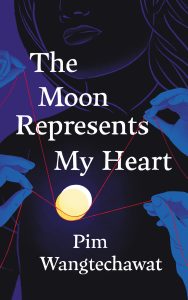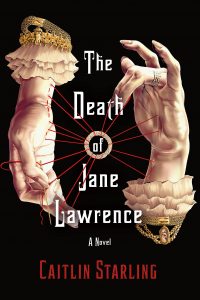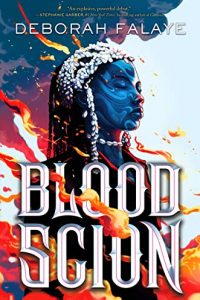Archita Mittra Reviews The Moon Represents My Heart by Pim Wangtechawat
 The Moon Represents My Heart, Pim Wangtechawat (Blackstone 979-8-21234-003-8, $25.99, 272pp, hc). June 2023.
The Moon Represents My Heart, Pim Wangtechawat (Blackstone 979-8-21234-003-8, $25.99, 272pp, hc). June 2023.
Pim Wangtechawat’s debut novel, The Moon Represents My Heart, is an ambitious, timey-wimey, multigenerational saga about love, grief, and healing, although for me it never quite reaches its emotional potential. The story revolves around a family of British-Chinese time travelers whose frequent forays into the past influence their relations in the present. Joshua and Lily plan a trip to the past but never return, and their children, Tommy and Eva, orphaned by time, must deal with the despair in their own ways. Through a series of nonlinear vignettes that often morphs into free verse, the author interrogates how the choices we make affect others, including future generations, and the cyclical nature of time travel stories is richly suited for this.
When it comes to time travel, there’s a sure surfeit of narratives out there. Obsessing over past mistakes, longing for second chances, and wishing to go back in time and do things differently make for stories that resonate with many people. The German TV show Dark invokes the metaphor of the labyrinth to represent both the threads of intergenerational trauma and the circuitous time loops the characters find themselves trapped in. In Audrey Niffenegger’s The Time Traveler’s Wife, the unpredictability of time travel is responsible for the vagaries in a couple’s romantic life. Toshikazu Kawaguchi’s Before the Coffee Gets Cold, in which characters visit a café to travel back in time to see their loved ones, concerns itself with mundane hopes and regrets, but with a magical twist. The enduring popularity of the science fiction series Doctor Who can also be attributed to its use of time travel as a narrative device to maximize drama.
The Moon Represents My Heart, which is already slated for a Netflix adaptation, riffs on all the above. It is equal parts romance and family drama. Wangtechawat’s fresh twist on the genre is that she endows each time traveler with a unique ability. For instance, Tommy can only travel solo to a specific time period (London between 1900 and 1950), while his sister, Eva, can travel back to the timelines of their close family members; their mother, Lily, can visit anywhere in England if she has a specific date and time in mind, while Joshua’s trips are limited to Hong Kong. Perhaps their abilities reflect their unique personalities; the opening chapter establishes this, with each member of the family describing their experience of time travel differently. This is followed by a family trip to meet Bruce Lee, after which Joshua and Lily embark on their ill-fated trip to the Victorian era and never return. The siblings are raised by their no-nonsense aunt and gradually grow estranged. While Eva finds solace and community in her art, Tommy escapes more and more into the past, traveling to 1930s London Chinatown to fall in love with a girl called Peggy, which jeopardizes the life he has built in the present, with a wife and daughter.
The nonlinear narrative isn’t hard to follow, but the emotional beats didn’t quite land for me – partly because I’ve already encountered similar stories and partly because of the prose style. Wangtechawat’s use of language is interesting: her sentences are mostly shorn of ornamentation, clean and simple, telling the reader everything they need to know. It makes for a lucid and breezy read, and at times, the line breaks are structured to mirror the cadence of poetry, but I didn’t find the result to be as poignant as perhaps intended. The text aspires to a certain literary quality, focusing more on the interiority of the characters rather than on the period settings, but its simplicity and what feels like a lack of detail might prevent the reader from becoming fully invested in the narrative. The narrative frequently ricochets between the past and the present, never giving readers the opportunity to properly immerse themselves in the worlds the characters inhabit, whether it is the premiere of a Bruce Lee film or a scene from the Second World War, which lowered the level of emotional engagement I felt with the book. The poetic structure of The Moon Represents My Heart, instead of elevating it, gives the experience of reading the outline of a novel, rather than the novel itself.
While the book tackles important topics, including parental conflict, racism, the immigrant experience, love stories across borders, and the therapeutic power of art, I didn’t feel it always did these themes justice. Nevertheless, The Moon Represents My Heart, with its experimental free verse form, will attract readers interested in time-travel narratives.
Archita Mittra is a writer and artist, with a fondness for dark and fantastical things She completed her B.A (2018) and M.A (2020) in English Literature from Jadavpur University and a Diploma in Multimedia and Animation from St. Xavier’s College.
When she isn’t writing speculative fiction or drawing fanart, she can be found playing indie games, making jewelry out of recycled material, reading a dark fantasy novel, baking cakes, or deciding which new Tarot deck to buy.
She lives in Kolkata, India, with her family and rabbits.
This review and more like it in the July 2023 issue of Locus.
 While you are here, please take a moment to support Locus with a one-time or recurring donation. We rely on reader donations to keep the magazine and site going, and would like to keep the site paywall free, but WE NEED YOUR FINANCIAL SUPPORT to continue quality coverage of the science fiction and fantasy field.
While you are here, please take a moment to support Locus with a one-time or recurring donation. We rely on reader donations to keep the magazine and site going, and would like to keep the site paywall free, but WE NEED YOUR FINANCIAL SUPPORT to continue quality coverage of the science fiction and fantasy field.
©Locus Magazine. Copyrighted material may not be republished without permission of LSFF.







